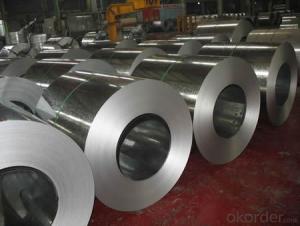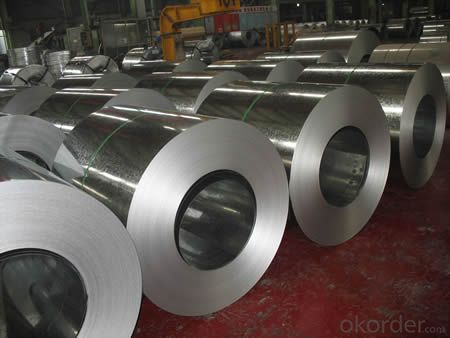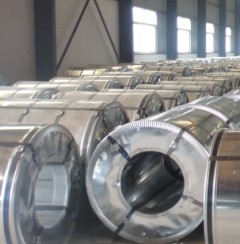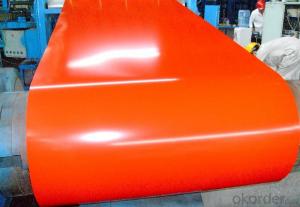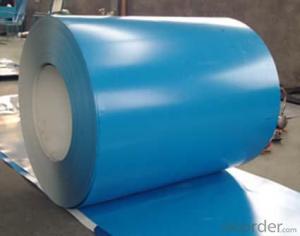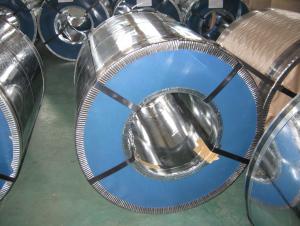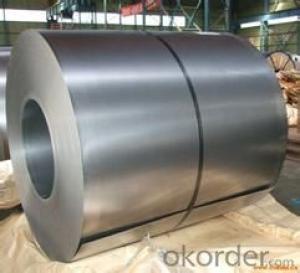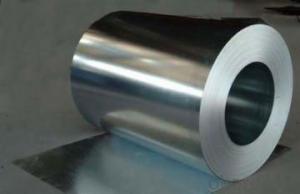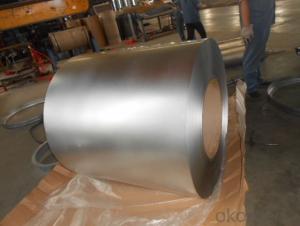Galvanized/Aluzinc Steel Sheet Coil in High Quality
- Loading Port:
- Shanghai
- Payment Terms:
- TT OR LC
- Min Order Qty:
- 100 m.t.
- Supply Capability:
- 10000 m.t./month
OKorder Service Pledge
OKorder Financial Service
You Might Also Like
Hot-dip Zinc Coating Steel Building Roof Walls
1.Structure of Hot-Dip Galvanized Steel Sheet Description:
Hot-dip galvanized steel coils are available with a pure zinc coating through the hot-dip galvanizing process. It offers the economy, strength and formability of steel combined with the corrosion resistance of zinc. The hot-dip process is the process by which steel gets coated in layers of zinc to protect against rust. It is especially useful for countless outdoor and industrial applications. Production of cold formed corrugated sheets and profiles for roofing, cladding, decking, tiles, sandwich walls, rainwater protective systems, air conditioning duct as well as electrical appliances and engineering.
2.Main Features of the Hot-Dip Galvanized Steel Sheet:
• Excellent process capability
• Smooth and flat surface
• Workability, durability
• Excellent anticorrosive property
• High strength
• Good formability
• Good visual effect
3.Hot-Dip Galvanized Steel Sheet Images:
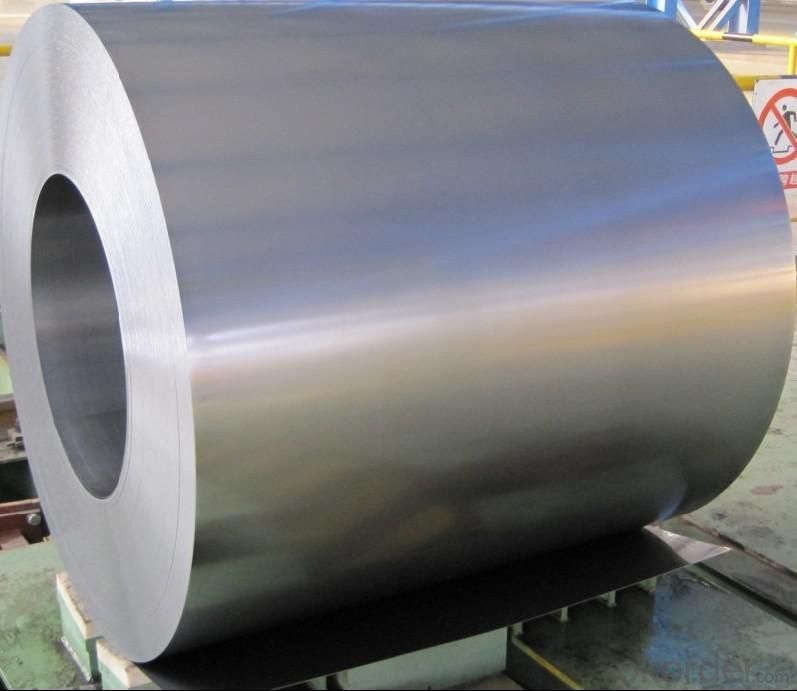
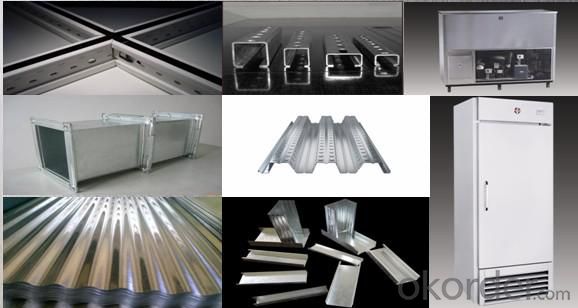
4.Hot-Dip Galvanized Steel Sheet Specification:
Standard: ASTM, JIS,EN
Grade: CS, DX51D+Z,SGCC, SS 230~550,S220GD+Z~S550GD+Z, SGC340~SGC570
Thickness: 0.1mm~5mm
Width: max 2000mm
Coil weight:3-12 MT
Coil ID:508/610mm
Surface structure: zero spangle, regular spangle or minimum spangle
Surface treatment: Chromate treatment, Oiled/dry, skinpassed/non-skinpassed
Packing: Standard seaworthy export package
Technology test results:
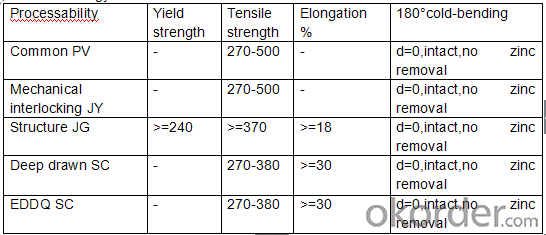
5.FAQ of Hot-Dip Galvanized Steel Sheet:
We have organized several common questions for our clients,may help you sincerely:
1.How about your company?
A world class manufacturer & supplier of castings forging in carbon steel and alloy steel,is one of the large-scale professional investment casting production bases in China,consisting of both casting foundry forging and machining factory. Annually more than 8000 tons Precision casting and forging parts are exported to markets in Europe,America and Japan. OEM casting and forging service available according to customer’s requirements.
2.How to guarantee the quality of the products?
We have established the international advanced quality management system,every link from raw material to final product we have strict quality test;We resolutely put an end to unqualified products flowing into the market. At the same time, we will provide necessary follow-up service assurance.
3. How long can we receive the product after purchase?
Usually within thirty working days after receiving buyer’s advance payment or LC. We will arrange the factory manufacturing as soon as possible. The cargo readiness usually takes 15-30 days, but the shipment will depend on the vessel situation.
- Q: many sword sellers sell swords made of 440 and stainless, i know those are both totally **** for real swords. so are 1045, 1060, or 1095 good grades of steel for a sword?
- Carbon Steel is the most common, while most live-steel(designed for use) ready sword utilize on of the spring steels you mentioned. Hybrid steel like those used in the Slayer series seem neigh-indestructible. The steel should be strong enough to not notch on a strike, but flexible enough to flex when you bend it, lest it shatter on a hard blow.
- Q: How are steel coils used in the production of agricultural implements?
- Steel coils are used in the production of agricultural implements as they are typically rolled into specific shapes and sizes to create parts such as blades, tines, and plowshares. These coils provide the necessary strength and durability required for farm machinery to withstand the demanding conditions of agricultural work.
- Q: How can the outer diameter and weight of steel coil be converted?
- To obtain the outer diameter of the steel coil is calculated according to the density of 7850, according to the density, in general, hot-rolled is 0. 96~0, 98, cold rolled, according to 0. 98~0. Ninety-nine
- Q: How do steel coils contribute to the renewable energy sector?
- Steel coils contribute to the renewable energy sector in several ways. Firstly, steel coils are used in the manufacturing of wind turbines. The towers of wind turbines are made of steel, and steel coils are used to fabricate the structural components of these towers. The high strength and durability of steel coils make them ideal for withstanding the harsh environmental conditions in wind farms. Moreover, steel coils are also used in the production of solar panels. Steel is used to create the frames and support structures that hold the solar panels in place. These frames need to be strong enough to withstand wind and weather conditions, and steel coils provide the necessary strength and stability. Furthermore, steel coils are used in the construction of transmission lines that carry electricity generated from renewable sources. Steel is widely used for the poles and towers that support these transmission lines, as it provides the necessary strength to bear the weight of the cables and withstand extreme weather conditions. In addition, steel coils play a crucial role in the manufacturing of energy storage systems. Renewable energy sources such as wind and solar are intermittent, and energy storage systems help to store surplus energy for later use. Steel coils are used in the fabrication of battery enclosures and racks, ensuring the safety and stability of these systems. Overall, steel coils contribute significantly to the renewable energy sector by providing the necessary strength, durability, and stability for various infrastructure components. Their use in wind turbines, solar panels, transmission lines, and energy storage systems helps to support the growth and development of renewable energy sources, making them an integral part of the transition towards a greener and more sustainable future.
- Q: What are the common surface defects in steel coils?
- Common surface defects in steel coils include scratches, pits, indentations, stains, and rust spots. Scratches can occur during handling or processing of the steel coils and can vary in depth and length. Pits are small depressions on the surface of the coil and can be caused by impurities in the steel or during the manufacturing process. Indentations are similar to pits but are usually larger and more noticeable. Stains can be caused by various factors such as chemicals, water, or other contaminants coming into contact with the steel surface. Rust spots occur when the steel is exposed to moisture or corrosive elements, leading to the formation of iron oxide. These defects can affect the appearance, quality, and performance of the steel, and it is important to address them to ensure the desired end-use of the coils.
- Q: What are the dimensions of steel coils used in the metalworking tool industry?
- The dimensions of steel coils used in the metalworking tool industry vary depending on the specific requirements of the tool being manufactured. However, common dimensions for steel coils in this industry range from 0.5 to 3 millimeters in thickness and 1000 to 2000 millimeters in width.
- Q: Can we construct a barn using steel and will it be a durable one?
- sure , steel barns are all over the place...the common brand of steel buildings around here are Butler Buildings...
- Q: How are steel coils used in the manufacturing of railway bridges?
- Steel coils are used in the manufacturing of railway bridges as they are formed and shaped into structural elements such as beams, girders, and plates. These steel components provide the necessary strength, durability, and load-bearing capacity to support the weight of trains and ensure the structural integrity of the bridge.
- Q: How do steel coil manufacturers minimize waste and maximize efficiency?
- Combining advanced technology, process optimization, and waste management practices allows steel coil manufacturers to minimize waste and maximize efficiency. One effective method is to employ advanced automation and control systems during production. These systems can monitor and adjust parameters like temperature, pressure, and speed to ensure optimal operation. By closely monitoring and controlling these factors, manufacturers can reduce defects and errors, thus minimizing waste. Another approach is to adopt lean manufacturing principles, which involve eliminating non-value-adding activities and streamlining the production process. By analyzing the entire workflow, manufacturers can identify areas for improvement, such as reducing setup times, eliminating bottlenecks, and optimizing material flow. This results in a more efficient and streamlined production process, reducing waste and increasing efficiency. Additionally, effective waste management practices can be implemented. This includes proper handling and disposal of waste materials, as well as implementing recycling programs. By separating and recycling materials like scrap metal, manufacturers can minimize waste generation and reduce environmental impact. Collaborating with recycling companies ensures proper management and recycling of waste materials. In conclusion, steel coil manufacturers can achieve waste reduction and efficiency maximization by utilizing advanced technology, implementing lean manufacturing principles, and adopting effective waste management practices. Continuously striving for improvement and optimization in processes enables manufacturers to reduce waste, increase productivity, and ultimately achieve higher levels of efficiency.
- Q: i heard steel type is good and i don't have any i have defeated all the trainers up to the icicle badge (i have got the icicle badge but not the one after) where can i get one?
- you can get a steelix at the cave just before the elite four. but if you have wifi, you can trade for one.
Send your message to us
Galvanized/Aluzinc Steel Sheet Coil in High Quality
- Loading Port:
- Shanghai
- Payment Terms:
- TT OR LC
- Min Order Qty:
- 100 m.t.
- Supply Capability:
- 10000 m.t./month
OKorder Service Pledge
OKorder Financial Service
Similar products
Hot products
Hot Searches
Related keywords
